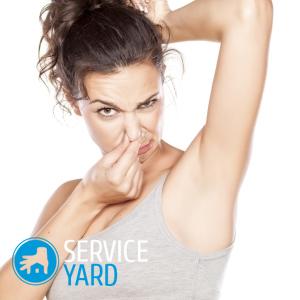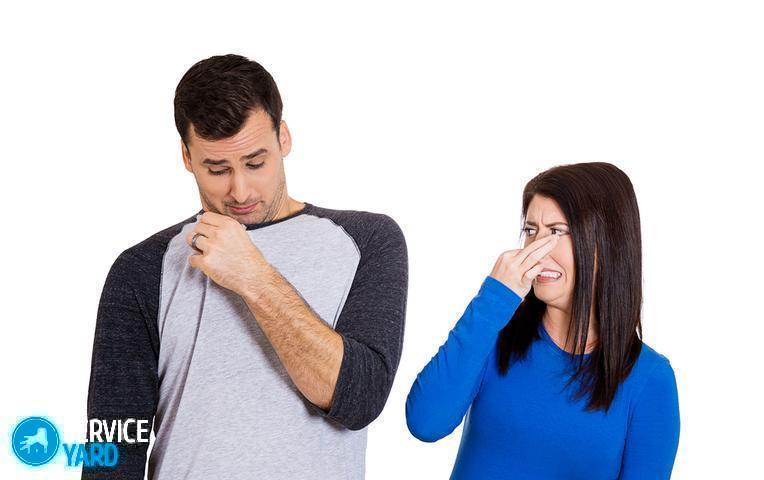Strong sweat odor

In the warm season, many people have a rather serious problem - excessive sweating. Ugly wet circles on clothes and a sharp strong smell of sweat in no way add to a person's attractiveness and self-confidence. How to get rid of an unpleasant “amber"? Read this article - you will find out.
to contents ↑What is sweating?
Sweating is a natural function of the body, aimed at cooling the body in the heat, under stress or emotional overload. In addition, sweating contributes to the regulation of metabolic processes in the body, maintaining the water-salt balance. From then toxic and unhealthy substances are removed from the body.
Important! With significant physical exertion and in the heat, sweat is the only way to protect the body from overheating.
How do sweat glands function?
Sweat glands are located in the dermis - the middle layer of the skin. Sweat is released on the surface of the skin along the ducts that exit. Its basis is water, in which salts and metabolic products are dissolved.
It turns out that the structure of sweat glands is different:
- ¾ glands are designed to regulate body temperature. They function regardless of human consciousness.
- ¼ sweat glands secrete, along with sweat, pheromones - substances responsible for the sexuality of men and women, causing attraction of people of the opposite sex.
Important! Sweat glands are unevenly distributed throughout the body. Most of them are on the forehead, under the arms, on the palms and feet. The glands that are responsible for secreting pheromones are located around the mammary glands, behind the ears, in the genital area, around the navel and between the buttocks. They respond to stress, sexual or emotional arousal.
Reasons for sweating
Sweating and foul odor can be caused by the following reasons:
- Excessive emotionality. If a person is angry, scared or very nervous, he begins to sweat intensely. As a rule, feet, face and palms sweat. The area of the chest and armpits sweats less often.
- Various diseases accompanied by high fever. The causes of fever can be colds, malignant neoplasms and many other factors. In this case, sweating is observed throughout the day, regardless of air temperature.
- Hormonal disorders. Often, excessive sweating affects women during menopause or after childbirth.
- Some foods (e.g. coffee) and medications (analgin, no-spa, diphenhydramine, morphine) contribute to sweating.
to contents ↑Important! People of different ages smell differently:
- The smell of a nursing infant is the aroma of milk or the complete absence of extraneous odors.
- The sweat of a teenager smells quite strongly, since the sweat glands begin to function intensely precisely during puberty.
- Men sweat more intensely, the smell of male sweat is quite harsh.
- Women's sweat has a slightly sour tint.
Sources of unpleasant “aromas”
Sweat itself is odorless. Of course, if a person does not eat too many spices and garlic, he does not abuse alcoholic drinks and coffee. The smell appears after the contact of sweat with the surface of the skin. The upper layers of the skin are saturated with keratin, and the liquid softens it. This is a fertile environment for the reproduction of bacteria.The waste products of microorganisms decompose, hence the unpleasant “amber”.
to contents ↑Important! The ancient Romans used baths with aromatic substances as a remedy for the smell of sweat and rubbed their bodies with essential oils. The courtiers of the French king Louis XIV literally watered themselves with perfumes, hoping to drown out the unpleasant odors of the unwashed body.
What diseases is sweat associated with?
Many diseases are associated with metabolic disorders. This means that the composition of the sweat and its smell change:
- In people with malignant neoplasms, liver problems, sweat smells like acetone.
- With genitourinary infections, pyelonephritis, renal failure, the patient smells of urine. This is because the excretory function of the kidneys is impaired, and the sweat glands partly take on this role.
- With tuberculosis or diabetes mellitus, the sweat acquires a vinegar smell.
- The appearance of an unpleasant sour smell in the area of the mammary glands in women indicates a beginning mastopathy.

This is not an exhaustive list of odors of a sick body. The smells of sheep’s wool, rotten apples, honey or even “old age” - all this speaks of a variety of diseases of the body, which a person does not even guess at first.
to contents ↑Important! If you are sure that you are not sick of anything, and the unpleasant smell of sweat haunts you, think about reviewing your diet. For example, exclude spices and spices from it.
Getting rid of a delicate problem
So, you have found the cause of excessive sweating. If the “aroma” is not too harsh, you can restrict yourself to conventional hygiene products and review your diet.
Deodorants and antiperspirants - which is better?
If the usual hygiene procedures are not enough to deal with unpleasant odors, cosmetics - antiperspirants and deodorants help to cope with them. Many mistakenly believe that these are synonyms, but this is not so:
- The composition of deodorants includes ethyl alcohol, which disinfects the place on which it is applied. So - there are no conditions for the reproduction of microbes and the associated unpleasant odors.
- The principle of action of antiperspirants is different. Sweating is reduced by more than half, due to the narrowing of the ducts of the sweat glands. You can not use antiperspirants in situations associated with profuse sweating (during physical work, sports). Without standing out, sweat can cause swelling in the armpit. And sometimes the abuse of antiperspirants can lead to heat stroke.
We are looking for a universal remedy
Here are some tips to help you effectively overcome the strong smell of sweat:
- Take a shower in the summer more often.
- Get rid of hair in the armpits. Hair is a good medium for the reproduction of microorganisms.
- Choose the right shoes and socks. Synthetic "non-breathing" materials contribute to the rapid growth of bacteria and the appearance of unpleasant odors.
- Helps to get rid of the sharp smell of sweat, a drug called "Urotropin." Moreover, its cost is not at all great.
Folk remedies
Solutions that help get rid of unpleasant amber can be prepared with your own hands:
- Use the recipe of the ancients - take a bath with infusions of cypress, pine and essential oils.
- Lemon juice with soda helps eliminate the unpleasant odor of sweat.
- A good natural deodorant is tincture of kombucha.
- Despite the fact that the smell of tar soap cannot be called pleasant, it well destroys microorganisms - the source of “aroma”.
- Drink infusions of mint, chamomile, water with lemon juice. These natural sedatives help to cope with stress, which means they help to reduce perspiration.
- Orange oil is an excellent natural remedy for the smell of sweat. Rub a small amount into problem areas and forget about the unpleasant problem.
Stock footage
If you tried all kinds of means, and the result is zero - make an appointment with a doctor. Maybe a strong smell of sweat indicates an onset disease.
- How to choose a vacuum cleaner taking into account the characteristics of the house and coatings?
- What to look for when choosing a water delivery
- How to quickly create comfort at home - tips for housewives
- How to choose the perfect TV - useful tips
- What to look for when choosing blinds
- What should be running shoes?
- What useful things can you buy in a hardware store
- Iphone 11 pro max review
- Than iPhone is better than Android smartphones



